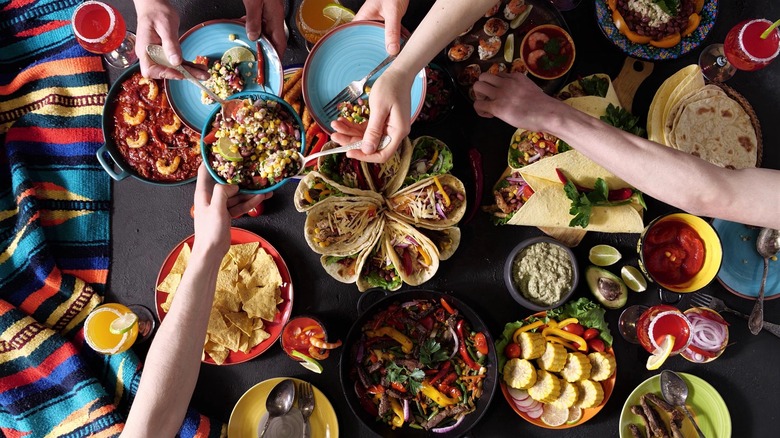What Is 'ICE' Dining Behavior? (& How To Avoid It At All Costs)
Cinema has no shortage of scenes of characters breaking dining etiquette. A great many are humorous, such as "The Blues Brothers" offending black-tie diners or the grotesque Mr. Creosote from "Monty Python's Meaning of Life" (if you've eaten before reading this, we advise that you NOT look up this clip). The reason these scenes are funny is because there are so many rules to follow when eating at a fine dining establishment. Everything from how you sip your wine, making sure the menu is touching the table, or how you fold your napkin crease is taken into account (via Food and Wine).
What about eating at home? Sharing home-cooked meals with family and friends can run the length of the emotional spectrum from joy to nightmare. Manners and table settings matter just as much at home as they do dining out, sometimes more so, according to Country Living. However, there is a certain type of behavior that, while seemingly unintentional for the slighting party, can cause offense.
Friends who cook for one another will often engage in a fair amount of comparison during meals. Someone could be amazing at roasting chicken, while another can dress an excellent salad. Unfortunately, expressing these comparisons out loud can sometimes lead to misunderstandings and the potential for rudeness. This notion, called invidious comparison eating, is a formerly subtle kind of one-upmanship that is becoming increasingly noticed and viewed in very bad taste.
Intentional or not, it's still rude
Huffpost describes invidious comparison eating, or ICE, as follows: "Potentially the most passive-aggressive bad-dining habit, ICE is when a person indirectly asserts a dish they're consuming is lesser by listing the "superior" merits of another version (usually their own)." In other words, your friend got all bent-out-of-shape when you compared their roast chicken to yours.
While this may seem harmless to anyone immune to the judgment of their peers, comparison is not always the highest form of flattery. It is one thing to exchange notes on recipes one-on-one over wine and canapés. But to intentionally put down the meal your friend put good effort into making, especially when done with an air of superiority, is classic rudeness that needs no name or acronym.
Still, if you're feeling sidelined by the emergence of ICE as a term, you're not alone. As TODAY points out, the term seems to have simply appeared out of thin air. So while it may seem easy to just dismiss ICE as another made-up issue, put yourself in someone else's shoes for a moment. Imagine you've put in all this effort to make a meal for everyone to enjoy, only for it to be downgraded by a few choice words from a guest. Hardly the stuff of lawsuits, but it still bears emotional weight.
How to avoid slipping on ICE
You can't change how others behave around you. You can change your own behavior, however, and the first step involves investigating your own actions. Notice that you may tend to disguise critical feedback by opening with a compliment. The term for this, as The Daily Mail explains, is known as a "complisult." Essentially, the opening compliment is utterly negated by the following criticism. Etiquette states that as a guest, it is your duty to maintain good manners by taking into consideration just how much work your host put into making dinner. Feedback is not required unless it explicitly asked for. Even then, think twice before speaking.
What happens if you are on the receiving end of ICE? Well, it would be equally rude to eject your guest from dinner over their faux-pas. TODAY suggests that, even though the ICE comment may aggravate or offend you, it need not be taken to heart or even acknowledged. A simple smile or a curt, but polite, retort is all that is required to move past this icy transgression.
There is also a socio-political class element to this theory. According to Huffpost, this behavior was once common among 19th century societal elites as a way of distinguishing themselves from the lower classes. Today, though, ICE is mainly the stuff of inconsiderate ego. Still, any type of behavior that seeks to denigrate the hard work of another individual is simply wrong and should always be avoided.


